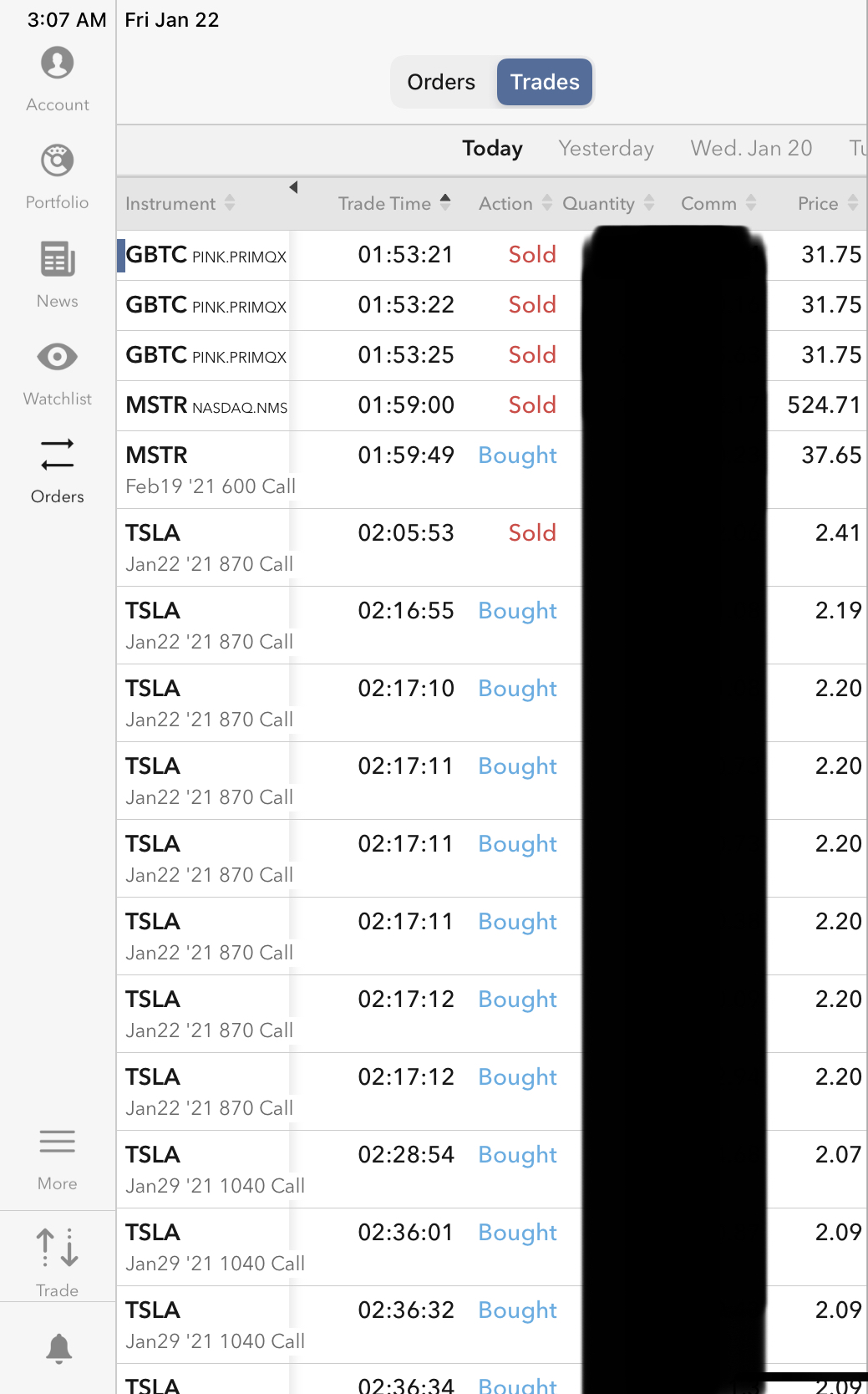Re <<BTC>>
GBTC is trading at a discount to BTC, and that can be good or not, for want-to-sellers / would-be-buyers. It remains useless except as a money-laundering tool, which I suppose is illegitimately useful against tyrannical officialdom, arguably, but in all cases a faith-based ethereal alt-asset.
The kids decided they did not like the volatility and commanded me to offload GBTC from their managed paper portfolios.
I offloaded all MSTR positions (long equity, short call) at profit, and 4% of the peak holdings GBTC also at profit. Only 1% of peak holdings left, and keeping it as a marker / reminder to buy back in.
Carried out quick raid of TSLA to make waking up middle of night more justified.

bloomberg.com
To Understand Bitcoin, Just Think of It as a Faith-Based Asset
The world’s favorite cryptocurrency was developed by a mythical figure whose writings are considered sacred texts. Its other religious trappings include true believers, holidays, and diets.
More stories by Joe Weisenthal
January 22, 2021, 1:41 AM GMT+8

Photo Illustration by 731. Photos: Getty Images, Shutterstock
Bitcoin has been around for more than a decade, and the total value of all outstanding coins recently broke $700 billion for the first time. Yet there’s still no consensus as to what precisely it is—one reason it can also plunge so spectacularly, as it has today. It’s called a cryptocurrency, but it doesn’t exactly behave like a currency. These days it’s trendy to call it “digital gold”—but it’s not a commodity exactly. Some think of it more like a startup, or a company like Facebook Inc. or PayPal Holdings Inc. Others call it a Ponzi scheme and think it’s a matter of time before it hits what they consider its true value ($0).
Financial metaphors aside, perhaps the best way to think of Bitcoin is as a kind of religious movement. I’m not suggesting that’s a bad thing—it’s for others to decide if crypto fans’ beliefs are justified. It just so happens, however, that many characteristics of a religion—from holidays to prophets—are found in Bitcoin.
Bitcoin was developed by a mystical figure, with no known corporeal presence, called Satoshi Nakamoto. His true name is unknown. At some point, Nakamoto stopped posting online altogether, departing the earthly plane. He’s never once sold a coin, either, creating this thing of massive value with no clear indication of having cashed in. A selfless figure.

Featured in Bloomberg Businessweek, Jan. 25, 2021. Subscribe now. Find more stories at The Year Ahead.
Photographer: Alamy (3); Getty Images (8); NASA (1)
Nakamoto’s writings are sacred texts. There’s the Bitcoin white paper and his early message board postings at Bitcointalk.com, where he corresponded with fellow cypherpunks interested in creating digital money. Those early correspondees are the Bitcoin saints. One is Hal Finney, the first known recipient of a Bitcoin transaction.
Finney died in 2014, but one day he might come back to life. He was cryogenically frozen at a facility in Scottsdale, Ariz., in the hopes of someday waking up to a rejuvenated body. All religions have metaphysics and implicit promises of eternal life. As Finn Bruton lays out in his book Digital Dash: The Unknown History of the Anarchists, Utopians, and Technologists Who Created Cryptocurrency, the prehistory of Bitcoin had a high overlap with the Extropian movement, which believed in eternal life through technology.
Bitcoin’s worldview has other religious features. There are devils (bankers and central bankers), implicit promises of riches for the true believers who HODL (hold without selling), and damnation for the no-coiners who reject the way (“Have fun staying poor” is a popular Bitcoin incantation).
There’s a Bitcoin diet ( carnivory). There are holidays, such as Bitcoin Pizza Day, and the Halving, which occurs every four years, when the pace of new Bitcoin issuance is cut in half. And there are sects and schisms. In 2017 a group that had a different vision for scaling Bitcoin forked off Bitcoin Cash. Then within that community, another group forked off and created Bitcoin SV (for Satoshi’s Vision).
Of course, not everyone who’s into Bitcoin cares about this stuff. Most are in it for the money and will bail the next time it goes through a big drop. But so far the big winners have been the adherents who’ve never wavered in their commitment to HODL. So if someone in your life bought Bitcoin and won’t stop talking about it and proselytizing it, now you know why: They’ve converted.
Sent from my iPad |




